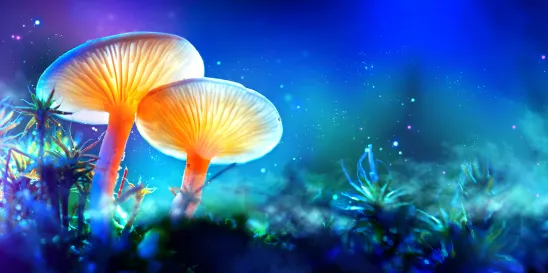The Struggle is Real
Over 17 million people in the United States are diagnosed with major depressive disorder (MDD). Antidepressants and psychotherapy are the leading forms of treatment; however, antidepressants are not always an effective long-term treatment for some MDD patients. In a recently published paper, the authors examined several major research reviews on the efficacy of antidepressants and concluded the benefits of antidepressants are minimal. With the onset of the COVID-19 pandemic, the situation is more severe. Mental health professionals and patients are left searching for other alternatives for treatment-resistant depression, defined as depressive symptoms that do not improve with the use of two or more standard antidepressant medications.
Can Psychedelics Be a Cure?
Psilocybin is the active ingredient in some species of mushrooms known as “magic mushrooms.” It is a Schedule 1 substance under the Controlled Substance Act of 1970. Studies in the 1950s and 1960s investigated the use of hallucinogens for treatment of depression, alcoholism, and other mental health issues, but most were criticized for various methodological flaws. After the Controlled Substance Act, research on various hallucinogens virtually ceased until 1992, when the National Institute on Drug Abuse and the FDA joined forces to allow research on psychedelic agents to resume.
Today, the efficacy of psilocybin as treatment for depression is still fraught with many limitations. However, researchers at Johns Hopkins recently reported that two doses of a synthetic psilocybin in combination with guided psychotherapy resulted in significant reductions in symptoms of depression. The published study had 24 participants who underwent two five-hour psilocybin-assisted therapy sessions. Outcomes were assessed at four weeks following treatment, with 71% of the participants continuing to score a 50% or greater reduction in depression and over half considered in remission. Although long-term use is still being researched, the study showed just two sessions of treatment improved symptoms for months.
Scientists do not know exactly how psychedelics work in helping patients with mental health disorders. A recent study, using brain imagery to examine the treatment effect of psilocybin, found that post-treatment brain effects of psilocybin were different from its acute effect during treatment on the brain. The authors suggested that psilocybin may act as a “reset” mechanism, allowing for the brain to resume normal functioning. Patients in the study used terms like “reset, reborn and rebooted.” Unfortunately, the sample size was small and lacked a control group so further studies are needed.
FDA-Approved Clinical Trials May Provide an Answer
As a result of successful outcomes from academic research, the FDA has since approved two clinical trials for psilocybin therapy for depression. In 2018, the FDA first designated Compass Pathways’ psilocybin treatment as breakthrough therapy for treatment-resistant depression and Phase 2B clinical trials are currently underway in Europe and North America. Breakthrough therapy designation is designed to fast-track the development of a drug for serious or life-threatening conditions.
Compass developed a synthetic form of psilocybin referred to as COMP360. Compass emphasizes that the use of psilocybin must include controlled psychological therapy from therapists who have the appropriate training through an FDA-approved program. According to Compass, the session typically includes the patient lying on a bed or sofa in a designated therapy room. After receiving a dose of psilocybin, the patient will typically listen to music and wear an eye mask to help focus internally. During the six to eight-hour session, the patient discusses his/her experiences and receives guidance from the therapist, with the goal of generating insights and ideas from the experience, and changing any unhelpful emotional and behavioral patterns.
At the end of 2019, the FDA also granted breakthrough therapy status for psilocybin therapy as a treatment for MDD to a US-based company, Usona Institute. Its Phase 2 clinical trial, which includes 80 participants from seven different sites across the country is expected to be completed by early 2021. Additionally, Canadian drug delivery companies are testing the effectiveness of oral dissolvable films as a better form of delivery for psilocybin use.
The Future is Bright, But You Have to Wear Shades
Given the state of current research and clinical trials underway, along with regulatory approval, psilocybin use restrictions have been loosened across various cities and the state of Oregon. It appears that the future of psychedelics as a treatment option for mental health disorders is fairly bright. One major concern, however, is maintaining its use in a controlled therapeutic session rather than just selling the drug in legalized dispensaries, as is the case for cannabis.
Additional research and a better understanding of the efficacy and brain mechanisms involved with the use of psilocybin drugs is needed. Furthermore, ethical, regulatory and legal ramifications surrounding the safe use of psilocybin drugs will pave the course for its future. As noted by Compass, if COMP360 is approved by the FDA its use will continue to be “subject to a significant degree of regulation by the DEA”.




 />i
/>i

